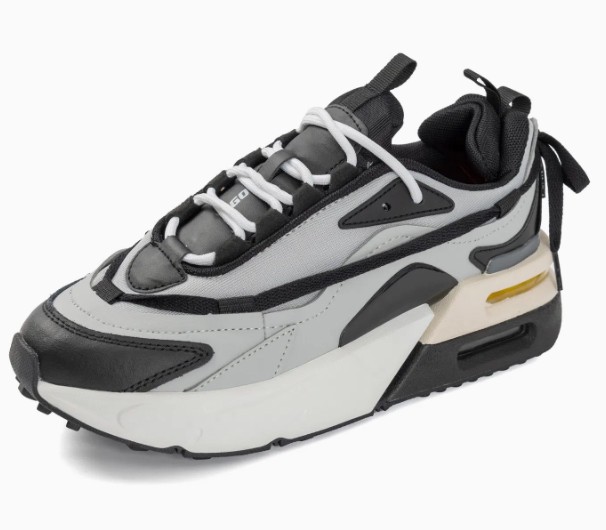The Ultimate Guide to Sports Shoes: Performance, Comfort, and Durability
Product description
Sports shoes are a must-have for anyone who is active, whether you're a professional athlete, a fitness enthusiast, or just someone looking to stay comfortable during daily activities. These shoes are designed to enhance performance, provide support, and minimize the risk of injury. In this guide, we’ll dive deep into the core features, benefits, and ideal uses of sports shoes, helping you make an informed decision before your next purchase.

Key Features of Sports Shoes
Sports shoes are engineered with specialized components to meet the diverse needs of various sports and physical activities. The design elements vary depending on the sport, but there are some universal features that make these shoes stand out.
1. Support and Stability: Sports shoes are crafted to provide optimal support for your feet, reducing stress on joints during intense physical activity. Whether you're running, playing basketball, or engaging in aerobic exercises, these shoes offer stability to ensure that you maintain the correct posture and movement alignment.
2. Shock Absorption: One of the primary advantages of sports shoes is their shock-absorbing capability. The midsole, typically made from foam or specialized cushioning materials, absorbs impact from every step, reducing the pressure on your feet and lower body. This makes them perfect for high-impact sports like running or basketball.
3. Breathability: Sports shoes often feature mesh uppers or other breathable materials that allow air to flow through the shoe. This helps to keep your feet dry and cool during strenuous activities, reducing the likelihood of discomfort or blisters.
4. Traction and Grip: Whether you're running on pavement or playing a sport on a court, sports shoes are designed with unique tread patterns or rubber outsoles that provide excellent traction. This ensures stability on different surfaces, preventing slipping and maximizing performance.
5. Durability: High-quality sports shoes are built to last. They are designed to withstand wear and tear from various activities, ensuring that they remain effective for extended periods.

Advantages of Wearing Sports Shoes
The benefits of sports shoes go beyond performance enhancement. Here are a few reasons why these shoes are essential for anyone engaging in physical activities:
1. Enhanced Performance: The right sports shoes can improve your agility, speed, and endurance by providing the necessary support and comfort.
2. Injury Prevention: Sports shoes are designed to reduce the risk of common injuries like sprains, strains, and shin splints, making them an essential tool for injury prevention.
3. Comfort and Fit: Sports shoes are made to accommodate the natural shape of the foot, ensuring a snug and comfortable fit that reduces the chances of discomfort or pain during exercise.

Ideal Use Cases for Sports Shoes
Sports shoes are versatile and can be used for a wide range of activities, including:
1. Running: Whether you're jogging around the block or training for a marathon, running shoes are designed to maximize comfort and support for long-distance runners.
2. Basketball: Basketball shoes provide ankle support, cushioning, and grip necessary for rapid movements and high-impact landings.
3. Gym Workouts: Sports shoes designed for gym use often feature flat soles and added support to handle weightlifting or high-intensity interval training.
4. Outdoor Activities: Trail shoes are built for outdoor adventures, providing durability, traction, and protection for activities like hiking, trekking, or trail running.

Frequently Asked Questions (FAQs)
Q1: What is the difference between running shoes and basketball shoes?
Running shoes are typically lighter with more flexibility and cushioning in the sole for forward motion. Basketball shoes, on the other hand, provide more ankle support and are designed for lateral movements and quick direction changes on the court.
Q2: How should sports shoes fit?
Sports shoes should fit snugly without being too tight. There should be enough room in the toe box to wiggle your toes, but the shoe should provide firm support around the arch and heel to prevent slippage.
Q3: Can sports shoes be used for everyday activities?
Yes, many sports shoes are versatile enough to be worn casually. However, if you're primarily using them for specific activities, make sure that they are designed for that purpose to ensure maximum benefit and comfort.
Q4: How often should I replace my sports shoes?
Typically, sports shoes should be replaced every 300-500 miles of use or every 6-12 months, depending on frequency and type of activity. If you notice a decrease in performance or increased discomfort, it may be time for a new pair.
Q5: Can sports shoes help with foot problems?
Yes, many sports shoes are designed with orthotic-friendly features that provide additional support for common foot problems such as flat feet, overpronation, or plantar fasciitis. Look for shoes with good arch support or consider custom insoles for extra comfort.

Conclusion
Sports shoes are more than just a necessity for athletes; they are a crucial tool for anyone looking to improve their physical performance, prevent injuries, and stay comfortable during intense activities. With features like support, shock absorption, and breathability, sports shoes are engineered to help you perform at your best. Whether you're running, playing basketball, or simply hitting the gym, investing in a quality pair of sports shoes will pay off in the long run, ensuring that you get the most out of every workout or competition.

Recommended products



